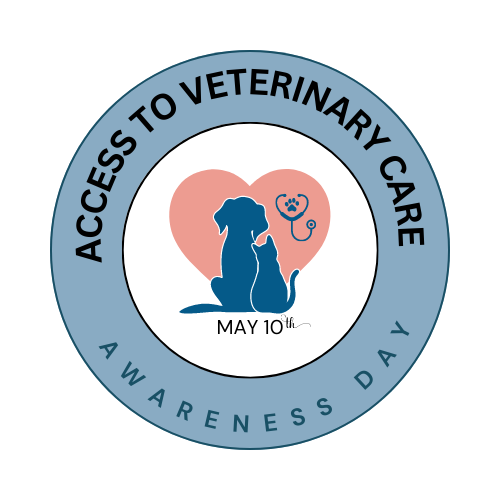Bridging the Gap: Promoting Access to Veterinary Care
In recognition of the growing challenges many pet owners face in accessing necessary veterinary care, in 2023 VetBilling spearheaded the creation of Access to Veterinary Care Awareness Day, which takes place on May 10, appropriately occurring during National Pet Week. This initiative underscores a critical and worsening issue—declining access to veterinary services for numerous pets and their families due to financial, geographical, and cultural barriers. VetBilling believes in actively addressing these challenges to better the lives of pets, pet parents, and the veterinary teams that care for them.

Defining “Access to Veterinary Care”
Let’s begin by defining what “Access to Veterinary Care” means. According to the ASPCA, access to veterinary care means that “owned dogs and cats universally and equitably receive care that improves their welfare, decreases suffering, and is compassionate, respectful, and considerate of pets and family circumstances.”¹
In January 2024, a literature review published in Frontiers in Veterinary Science defined access to veterinary care as “the economic, physical, social, mental, and emotional resources necessary for people to secure, communicate with, and benefit from the services of a trusted veterinary service provider…as needed to optimize the health and welfare of animals in their care.”²
Why Do We Need an Awareness Day for Access to Veterinary Care? The purpose of an awareness day is to encourage veterinary professionals to learn more about the prevalence of lack of access to care and how it impacts the well-being of pets, their caregivers, and veterinary teams; to suggest actionable recommendations for mitigating barriers to care at clinics; and to reduce stigma against pet owners experiencing financial limitations.
Understanding the Scope of the Problem
Access to veterinary care is essential for the well-being of pets, their caregivers, and veterinary teams. Unfortunately, the reality is that many pet owners encounter financial barriers that prevent them from obtaining the necessary healthcare their pets need. This not only compromises the health and welfare of the animals and their caregivers and families; it also places additional stress on veterinary professionals who are committed to helping these pets.
According to a seminal report published by the Access to Veterinary Care (AVCC) Coalition in 2018, approximately 1 out of 4 (28%) households have experienced barriers to veterinary care. The overwhelming barrier for all groups of pet owners was financial for all types of care (80% for preventative, 74% for sick, and 56% for emergency). The AVCC identified lack of access to veterinary care as “the most significant animal welfare crisis affecting owned pets in the United States.”³
Actionable Recommendations for Veterinary Clinics
Veterinary clinics are uniquely positioned to help bridge the gap in care. Here are several strategies that clinics can implement:

1. Adopt a Spectrum of Care/Contextualized Care Approach: Clinics can offer a range of treatment options to suit various budgets, ensuring that all pets receive necessary care without compromising service quality. Rather than immediately assuming that “gold standard care” is necessary, contextualized care allows for discussing various treatment options with clients, and helping them find the option that works best for their situation without judgment. It protects clients’ dignity and individual wishes and truly achieves informed consent.
2. Incorporate Accessible Pay-over-time Options: By implementing pay-over-time financing options, clinics can alleviate immediate financial pressure on pet owners, enabling them to make more sustainable health decisions for their pets. The most commonly available financing solutions offered by veterinary clinics are unfortunately not accessible by as many as 60% of pet owners, making it essential to consider other options such as all-inclusive membership-based care models like that offered by Garden Vets at Keele (Staffordshire, UK) and in-house financing managed by third-party payment management providers such as VetBilling.
Eliminating socioeconomic bias is key. Pet owners experiencing temporary financial constraints should not be judged as financially irresponsible or undeserving of their pets.
3. Embrace Cultural Sensitivity and DEI Initiatives: Cultivating an understanding and respect for cultural and language differences among pet owners can help veterinary teams engage more effectively with diverse communities, enhancing accessibility and inclusivity. To help your team communicate with Spanish-speaking clients, visit the website Vetspacito, where you’ll find short Spanish-language videos about preventive care, spay/neuter, heartworm disease, vaccines, and more.
Visit BlendVet, the nation’s first veterinary-curated DEIB training curriculum, to access a myriad of educational resources on Diversity, Equity, Inclusion and Belonging (DEIB.) Choose from an extensive offering of on-demand RACE-approved courses, enroll in their next scheduled Achiever program, obtain a workplace certification in DEIB, or request a consult.
4. Provide Telemedicine Services: Telemedicine can serve as a crucial lifeline for pet owners living in “veterinary deserts” or isolated locations who find it difficult to travel to a clinic. Telemedicine services can provide essential consultations as well as follow-up care remotely. An excellent resource for clinics interested in offering telemedicine services but not quite sure how to go about it is Dr. Crista Wallis’s guide, Beyond the Clinic Walls: Your Ultimate Guide to Veterinary Virtual Care, available through Amazon.
5. Create an In-House Angel Fund or Affiliate with a Veterinary-Specific Fund: Clinics can launch their own charitable funds to support pet owners facing financial hardships. They can recruit donors from among existing clients or hold fundraisers once or twice a year with all proceeds going to the angel fund. Some clinics host photos with Santa events, dog washes, raffles, bake sales, walk-a-thons…the possibilities are endless! For additional information, check out Dr. Stacee Santi’s article “Caring for the Cash-Strapped Client” in Today’s Veterinary Business.

If launching and managing your own clinic charitable fund isn’t feasible, you can partner with the Veterinary Care Foundation or the AVMF Reach Grant Program.
Learning and Resources
Education is fundamental to understanding and addressing the accessibility issues in veterinary care. Resources such as the Access to Veterinary Care Coalition Report and articles in the Access to Care section of Frontiers in Veterinary Science provide comprehensive insights into the barriers, current practices, and public policies that affect access to veterinary services. These are invaluable for veterinary professionals seeking to deepen their understanding and improve their practices.
If you’re interested in really deepening your knowledge about expanding access to care, consider taking Open Door Veterinary Collective’s certificate course, “Opening the Door to Veterinary Care.” Earn 6 CE hours when you successfully complete this self-paced, on-demand course that teaches every clinic how to increase access to care, while maintaining a sustainable, net positive revenue. The course features modules led by veterinary thought leaders like Ryane Englar, DVM, DABVP; Kate Boatright VMD; and Aimee St. Arnaud, founder of Open Door Veterinary Collective. We can’t recommend this course highly enough! At only $299 for the entire course, this is a can’t miss opportunity. It’s also a lot of fun, thanks to Terry Spencer, DVM, Open Door’s Director of Online Learning, whose colorful, creative, and engaging course design will have you looking forward to each module.
Help Us Increase Access to Veterinary Care Awareness
Every pet deserves a chance at health and happiness. We strongly support all efforts to keep pets in the loving homes they already have, instead of being euthanized or surrendered because of lack of access to care. That’s why promoting access to veterinary care goes beyond a single day of awareness—it’s about making a continuous commitment to compassion, empathy, and inclusiveness in our veterinary practices. Whether you’re a pet owner, a vet, or simply an animal lover, everyone can contribute to this cause.
Find downloadable resources here, including an Access to Veterinary Care Awareness Day logo and a summary of actionable ideas for improving access to care at your veterinary hospital.
Together, we can turn hardship into fellowship and ensure that no pet is left behind due to financial limitations. Let’s make a difference, one paw at a time!
References and Resources:
¹ ASPCA Access to Veterinary Care Resources. Accessed 5/9/2024. https://www.aspcapro.org/access-veterinary-care-resources
² Access to veterinary care: evaluating working definitions, barriers, and implications for animal welfare. Accessed 5/9/2024. https://www.frontiersin.org/articles/10.3389/fvets.2024.1335410/full
³ Access to Veterinary Care Coalition Report, published 2018, accessed 5/9/2024.
https://pphe.utk.edu/access-to-veterinary-care-report/
Enrollment link to Open the Door to Veterinary Care Certificate Course available through Open Door Veterinary Collective. Self-paced, on-demand, 6 CE hours. Cost: $299.
Spectrum of care: How it is helping vets be their best and ensure optimal patient health: A spectrum of care mindset provides a continuum of treatment options. Veterinary Practice News. Susan Miller DVM. Accessed 5/7/2023.
Payment options: An analysis of 6 years of payment plan data and potential implications for for-profit clinics, non-profit veterinary providers, and funders to access to care initiatives. H. Cammisa and S. Hill. Frontiers in Veterinary Science, Aug. 2022. Accessed 5/7/2023.
Supporting diversity, equity, inclusion, and belonging to strengthen and position the veterinary profession for service, sustainability, excellence, and impact AVMA Journal. Burkhard, Dawkins, Knoblaugh et al. May 2022. Accessed 5/7/2023.
Turn Hardship Into Fellowship: Start a charity or work closely with one to ensure that the pets of a financially challenged client get the care they need. Suiter, Abby, MBA, CVPM. Today’s Veterinary Business, December 2017. Accessed 5/7/2023.
Wonderful article to empower vets and owners to keep pets safe and well for everyone’s benefit.
Greatly needed philosophy and one we are striving to achieve in Australia with Pet Medical Crisis www.petmedicalcrisis.com.au
Funding veterinary care for pensioners in crisis and pets at risk. Saving veterinarian’s mental health stress and creating a kinder community.
Thank you so much for commenting, Jennifer! We’re so happy to hear of Pet Medical Crisis’s accomplishments in Australia. The need is so great. We all have something we can contribute to the goal of expanding access to veterinary care all over the world! But it’s an especially acute problem in the US, Canada, the UK, and Australia. I would love to hear from readers outside of those countries to see if they also have a large gap between veterinary prices and affordability for pet owners.